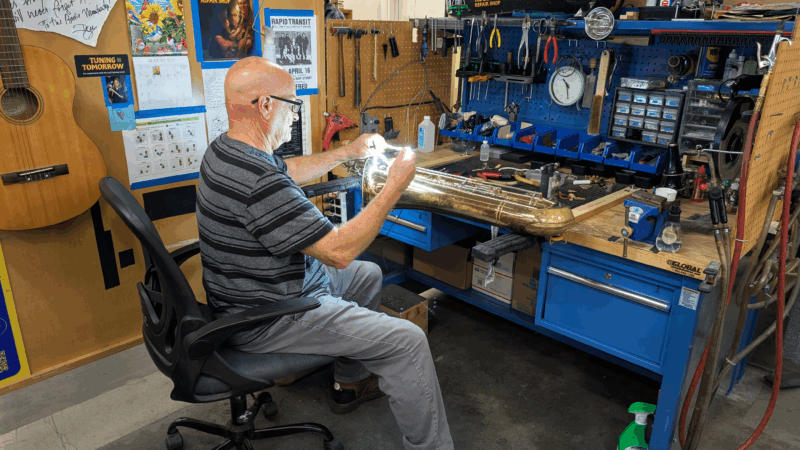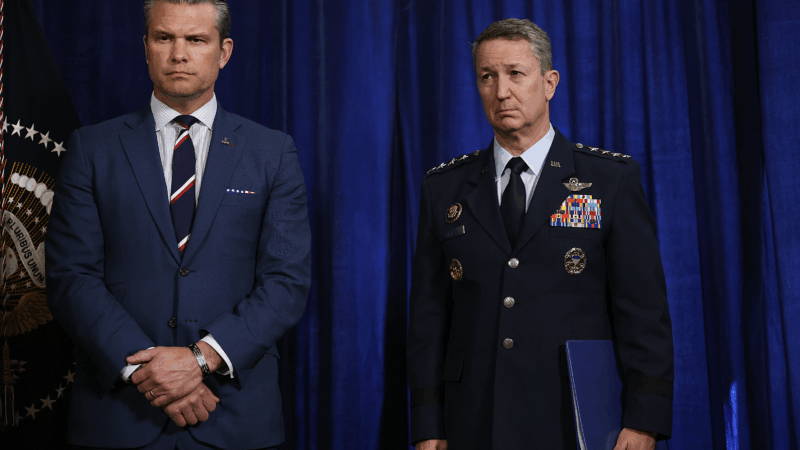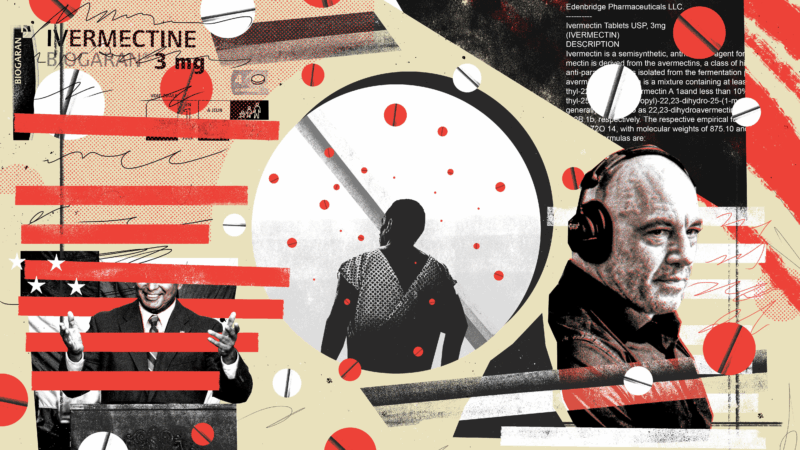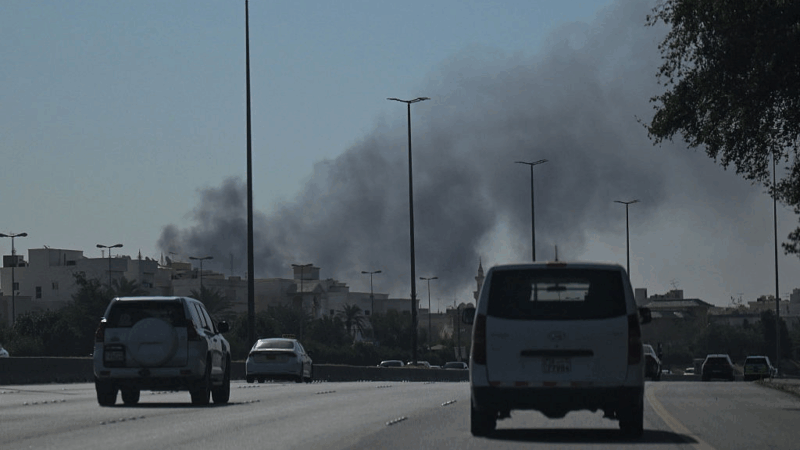This shop fixes student instruments for free. Now, a music legend is chipping in
At a warehouse in an industrial corridor of downtown Los Angeles, a handful of technicians are hunched over their brightly lit workstations, tinkering with saxophones, violins, and pianos.
This facility is one of the only remaining publicly funded repair shops for musical instruments in the country. Thousands of cases lay neatly stacked across tall shelves, ready to be shipped to schools across the nation’s second largest school district, Los Angeles Unified (LAUSD). These district-owned instruments and the repairs are a free service to students here.
“The shop is a jewel for the school district,” says Steve Bagmanyan, who started here in 2003 as a piano technician and now supervises the shop.
In a school district where about 80% of students come from low-income backgrounds, the repair shop helps create equitable access to quality instruments, he says, which can be expensive to own and maintain.
And it’s a huge help for educators, too. “For teachers not to think about what to do with a broken instrument, to think ‘where am I going to find repairs?’… That is all extra stress on a teacher.”

Bagmanyan and the technicians work quietly in the background, ensuring that about 120,000 instruments in circulation throughout the district are in working order. “That’s the magic of this place,” he says.
The repair shop was, for many years, largely invisible to students and families. That changed when it was featured in the documentary The Last Repair Shop, which won an Oscar last year. Since then, letters have been pouring in from students sharing their gratitude. “That’s our Oscar,” says Bagmanyan, pointing to a wall decorated with the notes. He says he’s seen the shop struggle and shrink in the past, during times of financial strain for the school district.
Now, the facility is getting a $1 million dollar donation from legendary musician, producer and philanthropist Herb Alpert, who got his start playing trumpet in this very school district.
A potential game-changer in a child’s life

Technician Paty Moreno has sat at the same workstation for over 21 years, where she primarily repairs brass instruments.
“People think, ‘I can play an instrument, so I can fix it too.'” But repairing delicate and sophisticated implements, she explains, requires special skills and tools. She considers it a dying craft.
As she puts finishing touches on a baritone horn that came into the shop with sticky valves, she says, “It’s a strange connection between us and the students.”
A few feet away, Duane Michaels is soldering a dented saxophone: “It’s going to be somebody’s grandkid, somebody’s kid, right? And so you kind of think of it that way, and you want it to play easily and in-tune to give the kid the best opportunity to succeed on it.”
Johanna Gamboa-Kroesen is a professor of music education at UCLA and says, “When students have an instrument that’s not working for them, it can be incredibly frustrating. It causes them to think music’s not for them.” So, she says, for a student to have access to free repairs “takes away that burden on families and lets [students] put their energy into just creating music.”
Music can play a role in children’s development, she adds, and helps with various aspects of their education. “Students learn to work with each other, learn to problem solve,” she explains. “When you learn music, you’re really activating all parts of you as a person. Your physical, kinesthetic awareness, your artistic and creative side and your analytical side.”
“You never know where a genius is”
Repair facilities like LAUSD’s once existed in several major public school districts, according to Craig Anderson, a retired technician who belongs to The National Association of Professional Band and Instrument Repair Technicians. He says that over the years, financial constraints and technicians retiring led many around the country to downsize or close down completely.
That is partly why Alpert, an eight-time Grammy winner who was once an LAUSD student himself, is investing in the repair shop. He considers it to be an essential part of the district’s music program.
“You never know what’s going to come out of a student who’s coming from a [low-income area] and picks up an instrument,” he says. “You never know where a genius is.”

If he hadn’t come across a trumpet at Melrose Elementary School back in the 1940s, Alpert says, he wonders whether he would have found his path to music.
“Lucky me, I was 8 years old in my grammar school and there was a music class and there’s a table filled with various instruments … and I happened to pick up the trumpet.”
Alpert says he couldn’t make a sound at first, but eventually the instrument became his voice.
“I’m a card-carrying introvert, and this trumpet was saying the things I couldn’t get out of my mouth. And I liked that, it was a good feeling … and I thought, ‘Man, I had this magical opportunity for myself when I was 8 years old. I’d like to pass that on.'”
“Everyone should have the opportunity to express themselves”
At San Fernando High School in L.A., 11th grader Maximiliano Segura says he, too, had his first run-in with a trumpet at school when he was around 8.
“It was cool and shiny,” he says with a laugh. “It really appealed to me when I first saw it. Like I knew it was a part of many genres like jazz or mariachi.”

Segura has been playing ever since, including in his school’s mariachi band.
He has always used a free, district instrument, but says that until he watched The Last Repair Shop, he hadn’t even considered that his instrument was also getting repairs for free all these years.
“To know that people from my background [have access to] instruments and music itself, it’s amazing.”
He often practices before, during and after school. And he’s already started saving to buy his own trumpet after graduation.
“I love music. I express myself through it, I think it’s just one of my best therapies that I could ever have. And I feel like everyone should have the opportunity to express themselves.”

Herb Alpert agrees: “Music should not be a privilege, it should be a part of the public education system.” He hopes more visibility around the repair shop will encourage other school districts to re-invest in such facilities, too.
While Alpert’s donation is part of a long career filled with philanthropy, he says the current political climate makes the investment feel more urgent. “I say, ‘why are public funds not being spent on this?’ This is a crucial part of a child’s development.”
To tell us your own story about how being a volunteer has shaped your life or nominate someone you think we should profile, fill out this form.
Hegseth: ‘We didn’t start this war but under President Trump we’re finishing it’
The remarks are the first to reporters since the U.S.-Israeli military operations against Iran began Saturday despite weeks of talks designed to stave off a conflict.
Ivermectin is making a post-pandemic comeback, among cancer patients
The anti-parasitic drug became a household name during the COVID-19 pandemic, and it is now being embraced as an alternative treatment for cancer. It is as politically polarizing as ever.
Rep. Adam Smith on the U.S. strikes on Iran and the debate over Trump’s war powers
NPR's Leila Fadel asks Democratic Rep. Adam Smith of Washington, the ranking member on the House Armed Services Committee, about President Trump's unilateral authorization to strike Iran.
Iran war widens, threatening to engulf Lebanon
The war over Iran engulfed more of the Middle East and beyond on Monday as Lebanon's militant group Hezbollah responded to the killing of Iran's spiritual leader with its first attack on Israel in more than a year.
Peer pressure can make this clownfish change its stripes
Tomato clownfish, in response to an unpredictable world, appear capable of adjusting when they lose their stripes based on cues from other fish and their habitat, a new study in PLOS Biology finds.
Hezbollah strikes Israel as American and Israeli planes pound Iran
Iran and Iranian-backed militias fired missiles at Israel and Arab states, apparently hitting the U.S. Embassy compound in Kuwait, while Israel and the United States pounded targets in Iran on Monday.






